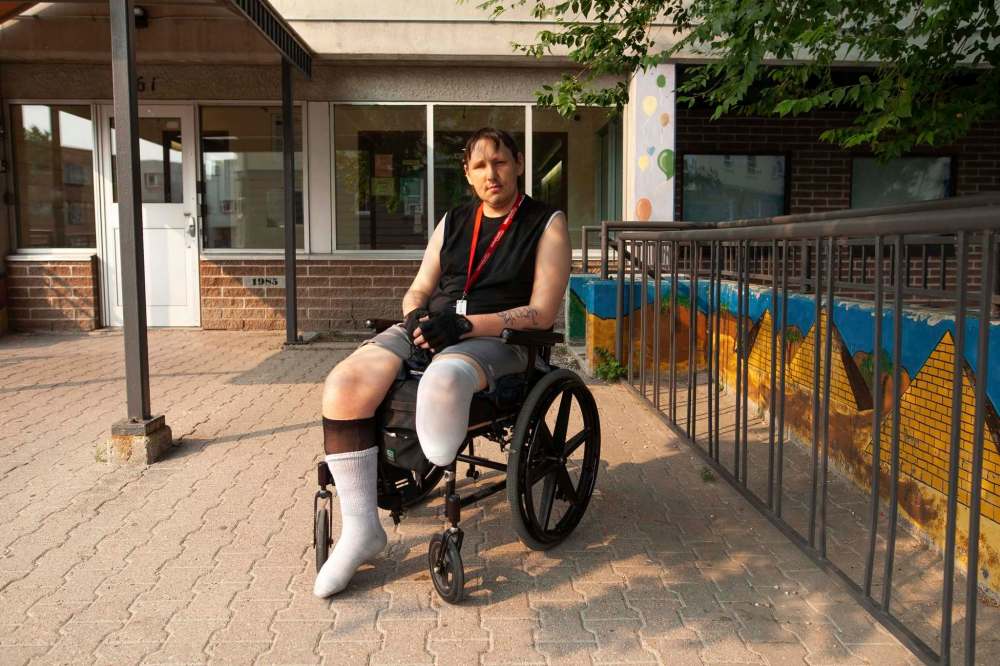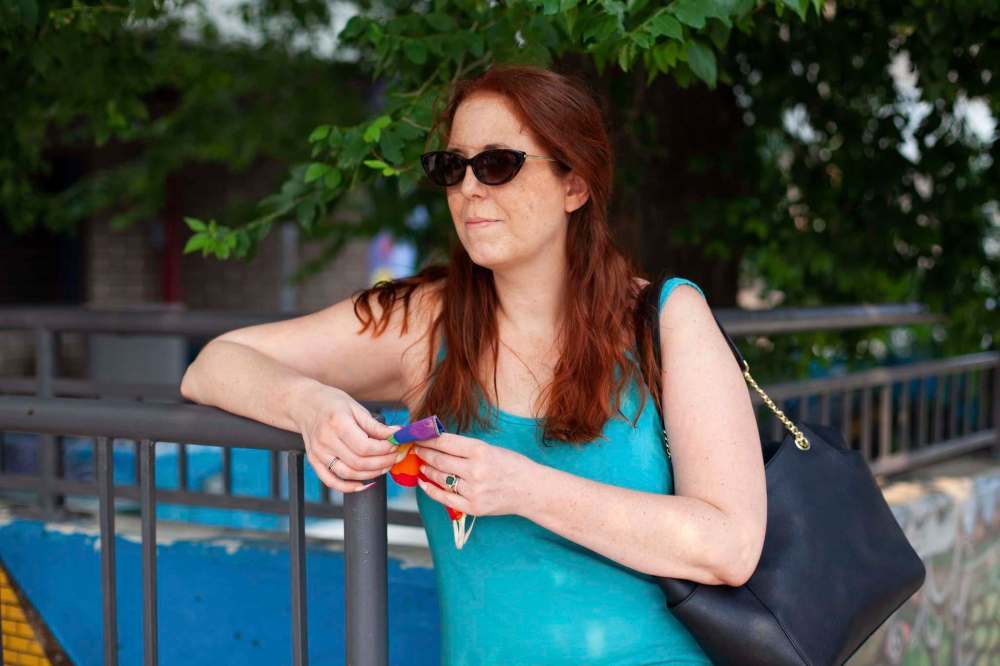Grassroots mutual aid group knows how to keep cool
Advertisement
Read this article for free:
or
Already have an account? Log in here »
To continue reading, please subscribe:
Monthly Digital Subscription
$19 $0 for the first 4 weeks*
- Enjoy unlimited reading on winnipegfreepress.com
- Read the E-Edition, our digital replica newspaper
- Access News Break, our award-winning app
- Play interactive puzzles
*No charge for four weeks then billed as $19 plus GST every four weeks. Offer only available to new and qualified returning subscribers. Cancel any time.
Read unlimited articles for free today:
or
Already have an account? Log in here »
Hey there, time traveller!
This article was published 18/07/2021 (1255 days ago), so information in it may no longer be current.
When the blistering sun beats down on Winnipeg, the temperature inside Andy Blacklaw’s downtown apartment becomes, too often, unbearable. Only one window in his third-floor public housing suite can open. He had a little air conditioner for a while, but it went on the fritz, and after that he just had to make do.
Some nights, he escaped to a friend’s home where he could stay cool. It wasn’t a permanent solution.
“It’s been pretty bad,” says Blacklaw, 39, chatting in the shade outside his apartment on a sweltering afternoon. “At the start you would think, ‘it’s just right now, it’ll get better.’ But it’s not stopping, and it’s going to get worse it seems. And it’s just like, ‘OK, I can’t do this by myself anymore.’ ”

In this, Blacklaw isn’t alone. It’s hard to know how many Winnipeggers live without adequate cooling, but there are certainly many. Now, as the ongoing heat wave settles over the city, some are turning to the one place they know might help: Mutual Aid Society (MAS), a grassroots group where the community takes care of itself.
The group launched on Facebook in early 2020, at the beginning of the COVID-19 pandemic. Today, it has over 9,500 members. Every day, dozens of people post looking for the things that they need, whether that be food or mattresses or diapers; others respond to share what they have, no questions asked.
Stick around MAS a while, and you notice how the people with the least are often the ones who give the most. Often, a person who jumps to share food one week is back the next, looking for a meal themselves. But that’s how it goes: people give when they can, and ask when they need.
It’s not charity, MAS organizers are quick to note: this is mutual aid, a way for people to stitch together the holes in the social safety net, to help where public services don’t, or can’t. And right now, finding ways to stay cool has become the most desperately sought-after form of support on MAS.
“Every single day, people are posting looking for fans or air conditioning,” says MAS administrator Kat Greer, a friend of Blacklaw’s. “The heat is getting really, really difficult for people.”
The requests rose alongside the mercury, often shared with heartbreaking stories. A woman posts looking for an air conditioner for an elder, whose apartment is too hot for needed oxygen cylinders. A mother hopes for a fan to give relief to her young children, who struggle to sleep on sheets drenched in sweat.
“The tone with which people are asking is increasingly more desperate,” Greer says. “People are saying, ‘my partner is getting sick.’ Someone messaged the other day because their partner has cancer and it’s making it really hard for them in the heat… It’s starting to take a toll on people’s physical wellbeing in many ways.”
In response, many have stepped up to donate their extra cooling devices, or even buy new ones to share if they can. Two weekends ago, MAS organizer Omar Kinnarath says, at least six air conditioners exchanged hands in the group, and some donors have messaged organizers privately offering to acquire more.
Still, demand for these appliances far outstrips the supply. Air conditioning can be very hard to come by for low-income families: many public housing apartments lack it entirely. Most portable or window models cost at least $250, and can run into the thousands; too much, for families struggling to make ends meet.
MAS organizer Ryan Beardy recalls a scene he witnessed once, while in line at a Giant Tiger. The family ahead of him was trying to buy bananas, supplies for their baby, and a fan. The cashier rang up the sale and the family couldn’t afford it; they had to put the fan back.
“Poverty is a barrier to keeping cool,” Beardy says. “It makes me feel good to be able to meet needs where society fails, especially having fallen through the cracks myself. But at the same time, it kind of sucks that we have to meet those needs. To me, it hurts to see the community in so much poverty.”
To help prioritize the need, MAS organizers have taken the unusual step of triaging who is looking for fans or air conditioners. Elders get priority, as well as those with young children and people with disabilities; in other words, people at the most health risk if they cannot find relief from the sizzling heat.
“It’s saving lives, it’s saving hospital visits,” Kinnarath says. “This isn’t a funded organization. This isn’t a place where you apply for things. If you have something someone needs, we’ll figure out a way to get it to you. What we’re trying to do now is, we’re trying to save a life.”
Blacklaw, who requires daily dialysis, is one of those who has now received a working air conditioner via MAS. At first, he was uncertain about making the request; until his leg was amputated four years ago, “I was never somebody who asked for help,” he says. So Greer posted to the group on his behalf.
Within two days, someone reached out to say they had an air conditioner to give. When Greer went to pick it up from a home in River Heights, the donor noted she’d been keeping it as a back-up, but realized it could help out more elsewhere: “when someone doesn’t have anything, what do I need a back-up for?” she said.

To many donors, the inspiration to share comes from their own experiences living with inadequate cooling.
“When you’ve been in the same situation as somebody, you remember. You know how much of a struggle it is,” Kinnarath says, chatting earlier this week as he parks his car on a West End street. “A lot of people on MAS are Indigenous, or immigrants, and that sharing is part of the culture already.”
At a duplex nearby, Jane Owen is waiting. She invites Kinnarath and MAS organizer Ryan Beardy inside, and points at a white, window-sized air conditioner sitting on the floor. She got a new one recently, and wanted to give her old one to someone who needs it.
“Oh man, you’re going to save someone’s life,” Kinnarath tells her.
As a single mother of two girls, Owen says, she knows what it’s like not to be able to afford things like an air conditioner. And she knows too how challenging it can be to care for kids in this kind of heat: “my daughter always gets so fussy if she’s hot,” she says.
After thanking Owen again, Beardy hoists the appliance and carries it out to the car. Ten minutes later, Kinnarath and Beardy are knocking on the door of a unit in a Weston-area Manitoba Housing complex. A woman opens the door and smiles as soon as she sees them, holding out her new air conditioner.
As they leave, Kinnarath points at the rows of windows in the complex. There’s one air conditioner, he points out, and another, but some units have none, and there is little shade over the units. Outside, children scamper about in bathing suits, trying to stay cool in heat that, for most of the day, inched well above 30 C.
As climate change continues to accelerate, hot weeks like these will become, more and more, the new summer normal. If society is to adapt, then that will also require finding ways to ensure that people can stay safe from the heat. That conversation is happening now at MAS, but it will have to get bigger than that.
“Mutual aid has always been the substitute for effective public policy,” Greer says. “If we had effective public policy that was taking care of people when they need it, we wouldn’t need communities like MAS. We’re still meeting a lot of need, a lot more than if we weren’t around.
“But we need something that’s really firm, that people can just go and get.”
melissa.martin@freepress.mb.ca

Melissa Martin
Reporter-at-large
Melissa Martin reports and opines for the Winnipeg Free Press.
Our newsroom depends on a growing audience of readers to power our journalism. If you are not a paid reader, please consider becoming a subscriber.
Our newsroom depends on its audience of readers to power our journalism. Thank you for your support.
History
Updated on Monday, July 19, 2021 6:29 PM CDT: Minor typo fix.

